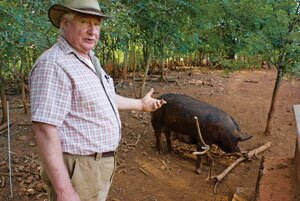FOOD- THE DISH- Pork spending: High-end bacon beckons the belly

This little piggy: Locally raised pork may be the new culinary trend, but Nelson County farmer Richard Bean got arrested last year for selling his pork to local restaurants.
FILE PHOTO BY JAY KUHLMANN
In this economy, politicians claim they won't pork barrel, so we've recently been wondering where all that bacon is going.
To our plates, apparently.
This little piggy recently went to Manhattan for a gastronomic adventure, following a scent trail of reviews by our favorite food writers for Gourmet, the Village Voice, and the New Yorker, among others, and noticed a trend real fast.
Pork belly (plus bacon strips) appeared beside sweetbreads at Bar Blanc and in the béchamel sauce on our gourmet grilled cheese at Resto. Pancetta was in the mix of the lamb shoulder and farro at Blue Hill and in Sushi Bar Hagi's spaghetti with ketchup. Even Claudia Roden garnished gazpacho with bacon.
So is Charlottesville in on this? Mas Tapas and The Upstairs come to mind as our beacons of high-end bacon, so we asked their chefs about pork trends.
"Trends?" Chef Tomas Rahal of Mas replied to an e-mail. "Well, I'd definitely say the trend is back towards traditional, heirloom, and sustainably raised animals." Best news we've heard lately, in our humble opinion.
Rahal explained that local Double H Farms and others are going back to the way farmers used to raise livestock, effecting marbling and full flavor that the industrialized pig lacks. And he suggests there's a trend among chefs, too. He writes, "The new (old) pork is more rich and flavorful, and chefs move away from exotic sauces and let you taste the meat again, like they do in España."
Unfortunately, going back to the old ways has its roadblocks. Last September, the owners of Double H. Farm, Richard Bean, 63, and Jean Rinaldi, 61, were arrested and hauled off their own farm in handcuffs for violating several FDA regulations, including transporting uninspected pork (because they processed the pigs themselves) and using the wrong labels on their products (the labels said "certified organic" even though the pork wasn't officially certified).
The couple was later released and allowed to continue under strict FDA guidelines, which they had been trying to comply with by driving their pigs to a processing plant in Fauquier County, but it was costing as much as $1,300 for four pigs. "We're not rich," Rinaldi pointed out.
No, but the Chipotle restaurant chain is, and earlier this year the company made a buy-local stand by announcing a plan to serve 100 percent local pork from nearby Polyface Farm at its Charlottesville location in Barracks Road, the only fast food restaurant in the country to do such a thing.
Last weekend, we caught up with Upstairs chef Jason Burke, at the end of dinner service— literally. Jason took our order at 9:58pm, on his birthday. Talk about devotion. After having him explain how he makes his sweetbreads so tender, we asked about pork.
"It's cheap," he replied. And we agreed that it's really good.
Recently one night, as Dish prepared Spaghetti Carbonara, finding ourselves taking an extra large portion of Benton's Smoky Mountain Hickory Bacon for good measure (and that stuff is the best), we realized pork supply might just be equaling demand.
In these times, that's a glimmer of a good economic policy. –- Kate Malay
Starr Hill brings home silver
The Starr Hill Brewing Company is at it again, winning awards. This time the Crozet-based brewery nabbed two silver medals at the Brewers Association's Great American Beer Festival— one for The Love, a South-German Style Hefeweizen wheat beer distinguished by its extremely light body, and flavored with hints of banana and clove; and another one for Smoke Out, a Hellerbock-style beer known for its distinctive, smoky flavor.
The Great American Beer Festival, held each year in Denver, evaluates craft brews from around the country. Medalists were selected from over 2,900 entries from more than 472 domestic breweries, and tastings were conducted by an international panel of 127 judges from 11 different countries. Over 75 categories of beer are judged at the annual competition.
Starr Hill has won 13 awards at the festival in the past nine years, an accomplishment that founder and Master Brewer Mark Thompson is particularly proud of.
"This is our fifteenth national award, and it's every bit as exciting as the first one was back in 1999," he says. "This is one of the most competitive festivals in the craft beer world, and it makes me very proud that a local beer like Starr Hill is acknowledged as being among the best."
So what's the secret to Starr Hill's success?
"We never release a new beer until we're confident it's good enough to compete on a national level," says Thompson. " We look at the brewing process as one part science, and one part art. And I think that approach gives our beers an extra depth that helps us stand out from the crowd."
#